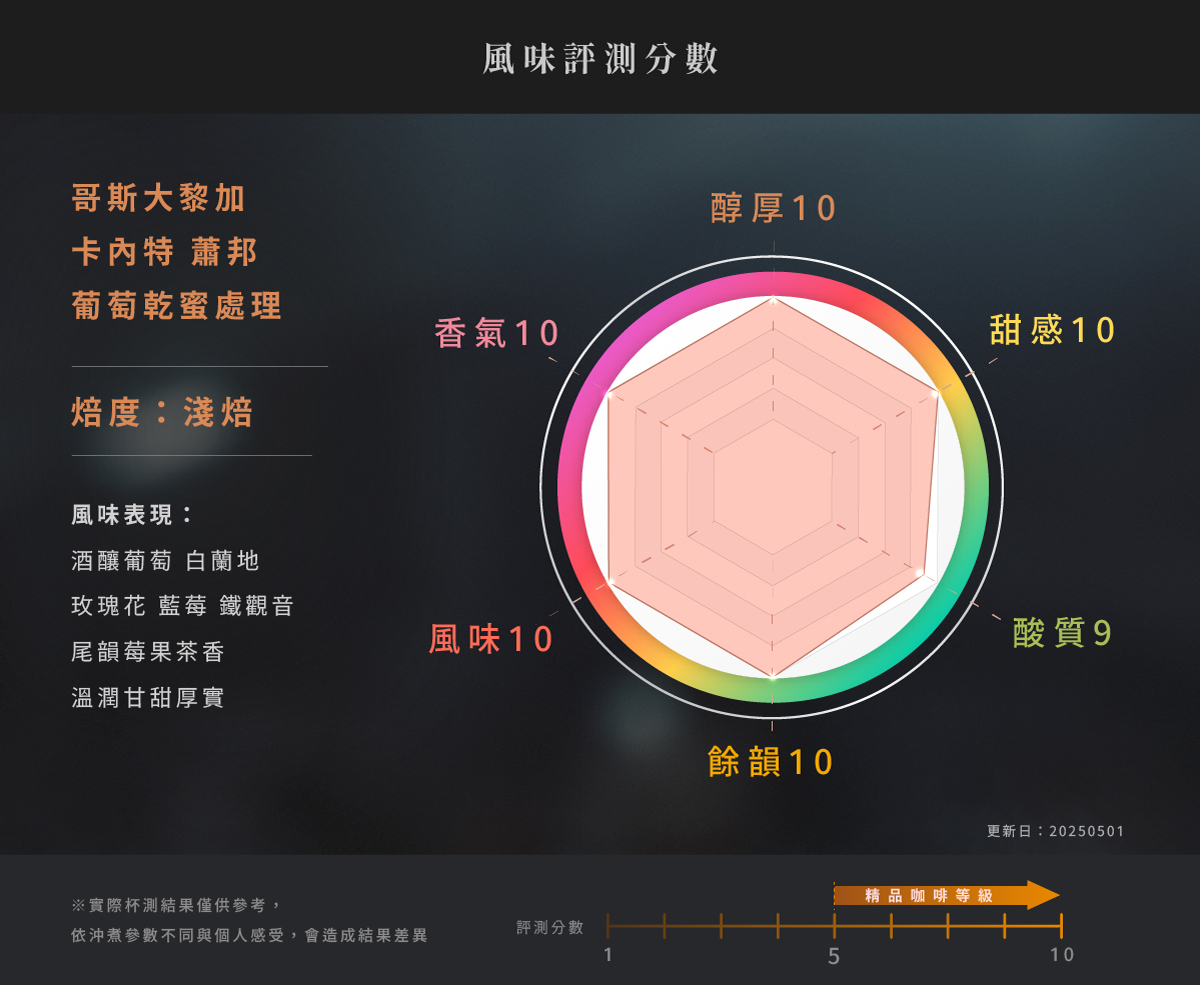

Costa Rica Carnet Estate Musician Series, Specialty Estate Coffee Beans, Includes 4 Options to Choose From:
Costa Rica Canet Musician Series Bach Raisin Honey


Costa Rica Carnet Musician Series Chopin – Raisin Honey
【Special Processing Method — Color Variation in Coffee Beans is Normal. Please Be Aware Before Placing an Order.】


Costa Rica Carnet Musician Series Mozart Raisin Honey
------
【Due to the special processing method, the color of the coffee beans may vary. Please understand this before placing an order.】
Costa Rica Canet Musician Series Beethoven Washed
【Due to the special processing method, the color of the coffee beans may vary. Please understand this before placing an order.】








Coffee Flavor
The flavors of coffee are derived from the breakdown of various nutrients in the green coffee beans during roasting. Heat causes these compounds to degrade into a variety of aromatic molecular structures, resulting in a wide spectrum of flavors. High-quality coffee beans naturally possess a rich aroma that evolves at different temperatures—high, medium, and low—offering a delightful and nuanced experience worth savoring.
Costa Rica Canet Musician Series Bach Raisin Honey
Strawberry Grape Hami Melon Champagne Soda Whisky
-----
Costa Rica Canet Musician Series Chopin Raisin Honey
Fermented Grapes, Brandy, Rose Flowers, Blueberries, Dried Pineapple, Tieguanyin, Berry Tea Aroma in the Finish, Sweet and Full-bodied
-----
Costa Rica Canet Musician Series Mozart Raisin Honey
Perfumed lily, honeycrisp apple, lemon, honey, cocoa, apple blossom finish, sweet and bright
-----
Costa Rica Canet Musician Series Beethoven Washed
Ginger Lily Melon Citrus Grape Calpis Clean and Crisp Smooth Mouthfeel

Carnet Estate (Canet) is situated in the highest altitude region for coffee cultivation in Tarrazu, Costa Rica.
The volcanic geological soil, rich in minerals, phosphates, sulfides, and other nutrients, has transformed central Costa Rica into a world-renowned coffee-producing area, with Tarrazu being one of its key regions. The estate produces SHB (Strictly Hard Bean) high-altitude, extremely hard beans, characterized by sweet flavors and strong notes of fruit, wine, and tea aromas.
This area is the most densely populated with fruit cultivation in Costa Rica. The estate primarily grows passion fruit, with coffee cultivation being relatively scarce and limited to a specific area. Therefore, special care is taken, including strict manual harvesting, where only perfectly ripe red cherry fruits are picked. Additionally, the Costa Rica Musician Series coffee utilizes an exclusive "Raisin Honey Process" to treat the coffee cherries, resulting in a coffee flavor with a full body and intense aroma.

卡杜拉(Caturra)-Arabica Coffee Varieties
Caturra is a mutation of Bourbon, first discovered in Brazil. It features a flavor profile with lemon or citrus acidity and fruity sweetness. Although its sweetness is not as pronounced as Typica and Bourbon, proper roasting can significantly enhance its sweetness. The sweetness of Caturra is determined by the frequency and amount of fertilization applied by the grower, and the harvesting period requires 2 years with higher maintenance costs, which limits its yield.
 (Coffee Processes)
(Coffee Processes)
The term "processing methods" refers to the process of transforming ripe red coffee cherries into dried green beans. Each method has its advantages and disadvantages, influenced by the natural environment and the specific needs of the coffee-producing region. As a result, different regions adopt the processing method most suited to their conditions. This batch uses the Raisin Honey and following three processing methods, described below:
【Honey / Pulped Natural / Semi-dry Process】
The honey process is a method that combines elements of both the natural process and the washed process. This technique was initially developed in Costa Rica. Similar to the washed process, the skin and pulp of the coffee cherries are removed, but the fermentation step is skipped. Instead, the mucilage layer (a sticky, sugary layer around the bean) is left intact and dried under sunlight.
The term "honey" does not refer to the addition of actual honey. Rather, it derives from the sticky texture of the mucilage, which resembles honey. The retention of this layer, rich in sugars and acids, is the key to the honey process. The amount of mucilage left on the beans determines the sweetness and flavor complexity:
The Raisin Honey Process differs from the traditional honey process in that the coffee cherries undergo two fermentation stages. First, the coffee cherries are sun-dried until they reach a raisin-like state. After the initial fermentation of the pulp and pectin, the skin and pulp are removed, leaving only the pectin to ferment a second time. This processing method is similar to fermenting wine, where controlling the temperature and time develops different layers of flavor! This is a notably sweet processing method, offering the taste of white wine with balanced acidity. The fermentation notes are more pronounced in the flavor profile.
This processing method is a star variety currently being promoted in Costa Rica. F1 refers to the first generation resulting from the crossbreeding of two different varieties, species, or genera. F1 varieties typically have higher yields, superior quality, consistent quality, vigorous growth, and excellent resistance to diseases and pests. Most commonly seen coffee varieties today are subspecies of Arabica, which generally have insufficient genetic complexity. Over the past 10-15 years, various coffee-growing regions have been plagued by leaf rust, prompting active research into F1 varieties. Researchers first identified two genetically diverse varieties, Villa Sarchi and Timor. Villa Sarchi represents flavor, while Timor carries the Robusta gene for disease resistance. By crossbreeding and selecting the offspring, they developed the T5296 variety, which is disease-resistant and has decent yields. To further pursue flavor excellence, T5296 was crossbred with other varieties known for better flavor profiles. In 2015, the World Coffee Research Center began investing in the development of new F1 varieties.
--------
Enzyme Washed Process first removes defective coffee beans through water washing. The processed beans are then placed into a sealed container, where enzymes are added, and carbon dioxide is introduced to displace oxygen. In this anaerobic environment, the decomposition of sugars in the coffee pectin slows down, and the pH level decreases more gradually, extending the fermentation time. This process develops better sweetness and a more balanced flavor in the coffee.





JUSTIN INTERNATIONAL FOOD ENTERPRISE CO., LTD.
Tel: +886-3-358-6611
1st Floor, No. 30, Lane 120, Daxing Road, Taoyuan District, Taoyuan City
▶This product is covered by a NT$10 million product liability insurance.
▶Food Industry Registration Number: F-165601955-00000-0
▶ Our company’s cupper is certified as a CQI International Coffee Quality Appraiser.


 Recommended Products
Recommended Products



※ For detailed shipping and payment information, invoices, overseas ordering instructions, etc., please click here to enter.
